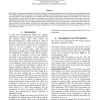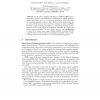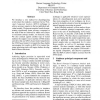184 search results - page 10 / 37 » Learning Expressive Models for Word Sense Disambiguation |
BMCBI
2010
13 years 7 months ago
2010
Background: Word sense disambiguation (WSD) algorithms attempt to select the proper sense of ambiguous terms in text. Resources like the UMLS provide a reference thesaurus to be u...
LREC
2010
13 years 9 months ago
2010
In this article, we present an experiment of linguistic parameter tuning in the representation of the semantic space of polysemous words. We evaluate quantitatively the influence ...
AAAI
2006
13 years 9 months ago
2006
The scarcity of manually labeled data for supervised machine learning methods presents a significant limitation on their ability to acquire knowledge. The use of kernels in Suppor...
CORR
2000
Springer
13 years 7 months ago
2000
Springer
In this paper Schapire and Singer's AdaBoost.MH boosting algorithm is applied to the Word Sense Disambiguation (WSD) problem. Initial experiments on a set of 15 selected polys...
ACL
2004
13 years 9 months ago
2004
We introduce a new method for disambiguating word senses that exploits a nonlinear Kernel Principal Component Analysis (KPCA) technique to achieve accuracy superior to the best pu...



